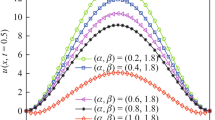Abstract
A discrete comparison principle is given for the multi-term time fractional diffusion equation, where the discrete scheme is based on L1 approximation of the multi-term temporal Caputo derivative and the standard finite difference approximation of the spatial derivative. Then we use the discrete comparison principle to give an error analysis of the discrete scheme by constructing a barrier function. The final numerical results verify our theoretical analysis under the realistic assumption that the solution of the time fractional diffusion equation has a weak singularity near the initial time t = 0.
Similar content being viewed by others
Data Availability
All data included in this study are available upon reasonable request.
References
Constantinescu, C.D., Ramirez, J.M., Zhu, W.R.: An application of fractional differential equations to risk theory. Finance Stoch. 23(4), 1001–1024 (2019). https://doi.org/10.1007/s00780-019-00400-8
Zhou, X., Zhang, M., Wu, T.: Adaptive image denoising based on fractional differential operator and gauss curvature. Modern Electron. Tech. 42(15), 54–58 (2019). https://doi.org/10.16652/j.issn.1004-373x.2019.15.014
Leonenko, N.N., Papić, I., Sikorskii, A., Šuvak, N.: Approximation of heavy-tailed fractional Pearson diffusions in Skorokhod topology. J. Math. Anal. Appl. 486(2), 123934–22 (2020). https://doi.org/10.1016/j.jmaa.2020.123934
Zheng, M., Liu, F., Anh, V., Turner, I.: A high-order spectral method for the multi-term time-fractional diffusion equations. Appl. Math. Model. 40(7-8), 4970–4985 (2016). https://doi.org/10.1016/j.apm.2015.12.011
Qin, S., Liu, F., Turner, I., Vegh, V., Yu, Q., Yang, Q.: Multi-term time-fractional Bloch equations and application in magnetic resonance imaging. J. Comput. Appl. Math. 319, 308–319 (2017). https://doi.org/10.1016/j.cam.2017.01.018
Liu, F., Meerschaert, M.M., McGough, R.J., Zhuang, P., Liu, Q.: Numerical methods for solving the multi-term time-fractional wave-diffusion equation. Fract. Calc. Appl. Anal. 16(1), 9–25 (2013). https://doi.org/10.2478/s13540-013-0002-2
Shen, S., Liu, F., Anh, V.V.: The analytical solution and numerical solutions for a two-dimensional multi-term time fractional diffusion and diffusion-wave equation. J. Comput. Appl. Math. 345, 515–534 (2019). https://doi.org/10.1016/j.cam.2018.05.020
Jin, B., Lazarov, R., Liu, Y., Zhou, Z.: The Galerkin finite element method for a multi-term time-fractional diffusion equation. J. Comput. Phys. 281, 825–843 (2015). https://doi.org/10.1016/j.jcp.2014.10.051
Li, Z., Liu, Y., Yamamoto, M.: Initial-boundary value problems for multi-term time-fractional diffusion equations with positive constant coefficients. Appl. Math. Comput. 257, 381–397 (2015). https://doi.org/10.1016/j.amc.2014.11.073
Diethelm, K.: The Analysis of Fractional Differential Equations. Lecture Notes in Mathematics, vol. 2004, p 247. Springer, Berlin (2010). An application-oriented exposition using differential operators of Caputo type
Chen, H., Stynes, M.: A discrete comparison principle for the time-fractional diffusion equation. Comput. Math. Appl. 80(5), 917–922 (2020). https://doi.org/10.1016/j.camwa.2020.04.018
Huang, C., Liu, X., Meng, X., Stynes, M.: Error analysis of a finite difference method on graded meshes for a multiterm time-fractional initial-boundary value problem. Comput. Methods Appl. Math. 20(4), 815–825 (2020). https://doi.org/10.1515/cmam-2019-0042
Stynes, M.: Singularities. In: Handbook of Fractional Calculus with Applications, vol. 3, pp 287–305. De Gruyter, Berlin (2019)
Chen, H., Hu, X., Ren, J., Sun, T., Tang, Y.: L1 scheme on graded mesh for the linearized time fractional KdV equation with initial singularity. Int. J. Mod. Sim. Sci. Comp. 10(1941006), 18 (2019). https://doi.org/10.1142/S179396231941006X
Chen, H., Stynes, M.: Blow-up of error estimates in time-fractional initial-boundary value problems. IMA J. Numer. Anal. 41(2), 974–997 (2021). https://doi.org/10.1093/imanum/draa015
Huang, C., Stynes, M., Chen, H.: An α-robust finite element method for a multi-term time-fractional diffusion problem. J. Comput. Appl. Math. 389, 113334–8 (2021). https://doi.org/10.1016/j.cam.2020.113334
Chen, H., Shi, Y., Zhang, J., Zhao, Y.: Sharp error estimate of a Grünwald-Letnikov scheme for reaction-subdiffusion equations. Numer. Algoritm. 89(4), 1465–1477 (2022). https://doi.org/10.1007/s11075-021-01161-2
Funding
This work is supported in part by the National Natural Science Foundation of China under Grant 11801026, and Fundamental Research Funds for the Central Universities (No. 202264006).
Author information
Authors and Affiliations
Corresponding author
Ethics declarations
Conflict of interest
The authors declare no competing interests.
Additional information
Publisher’s note
Springer Nature remains neutral with regard to jurisdictional claims in published maps and institutional affiliations.
Rights and permissions
Springer Nature or its licensor (e.g. a society or other partner) holds exclusive rights to this article under a publishing agreement with the author(s) or other rightsholder(s); author self-archiving of the accepted manuscript version of this article is solely governed by the terms of such publishing agreement and applicable law.
About this article
Cite this article
Wang, Y., Zhao, Y. & Chen, H. Discrete comparison principle of a finite difference method for the multi-term time fractional diffusion equation. Numer Algor 93, 1581–1593 (2023). https://doi.org/10.1007/s11075-022-01480-y
Received:
Accepted:
Published:
Issue Date:
DOI: https://doi.org/10.1007/s11075-022-01480-y
Keywords
- Discrete comparison principle
- Multi-term time fractional
- Finite difference method
- Error analysis
- α-robust



